Речевые практики. Рубрика в журнале - Новый филологический вестник
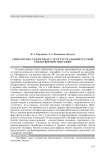
Типология субъектных структур реальной русской стихотворной эпитафии
Статья научная
В статье разные типы субъектных структур анализируются на материале текстов реальных стихотворных эпитафий, то есть надписей на надгробиях. Материалом для анализа явились 487 текстов реальных эпитафий ХVIII– ХХ вв. Намечена типология вариантов субъектной организации текстов стихотворных надгробных надписей. Тексты реальных стихотворных эпитафий, оказываясь одновременно явлением эстетическим и собственно «жизненным», обнаруживают механизмы формирования субъект-субъектных отношений как в речевом акте вообще, так и в собственно «поэтическом» высказывании. Особое внимание уделено принципиальному отличию реальных эпитафий от «книжных», функционирующих вне надгробий – на страницах книг и журналов. Субъектная структура реальной стихотворной эпитафии обусловлена ее принципиально двойственной природой и прежде всего непосредственной связью с действительностью, с собственно человеческими отношениями в ситуации смерти и погребения умершего. Именно эта связь, погруженность не в «эстетику», но в «жизнь», отличает реальные эпитафии от фиктивных. Ярче, нагляднее всего это проявляется в разных формах функционирования и восприятия, прочтения эпитафии реальной и эпитафии фиктивной, книжной. Особые установки функционирования и последующей рецепции реальной эпитафии прямо влияют на ее текст, в частности на формирование специфических субъект-субъектных отношений. В тексте реальной эпитафии актуализируется третий участник коммуникации – «коллективное сознание» «прохожих» (посетителей кладбища). «Оглядка» на мнение этого заинтересованного реципиента-прохожего неизбежно заложена в процесс создания (выбора) текста реальной эпитафии. Именно уникальная природа такого общения становится продуктивной для формирования диалогических отношений в реальной стихотворной эпитафии.
Бесплатно
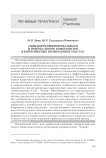
Типы корреляции вербального и невербального компонентов в конфликтных поликодовых текстах
Статья научная
Настоящая работа продолжает цикл исследований, посвященных вопросам корреляции элементов разных семиотических кодов в структуре поликодовых текстов, репрезентации смыслов в составе их вербального и иконического компонентов, в том числе в рамках конфликтной интернет-коммуникации. Непосредственной целью является установление специфики корреляции вербального и невербального компонентов в графико-вербальных поликодовых текстах (мемах) конфликтного характера. Устанавливаются модели корреляции вербального и иконического компонентов. Определяется их частотность актуализации в данных текстах, а также продуктивные и непродуктивные модели. Анализируются особенности соотнесенности компонентов при репрезентации транслируемых смыслов в рамках когнитивной матрицы «Свой - Чужой». Обосновывается, что противопоставление отдельных элементов содержания в рамках дихотомии «Свой - Чужой» активно реализуется в текстах конфликтного характера, где представлено как дублирование и дополнение, так и только дополнение отдельных составляющих вербального и иконического компонентов. Такое соотношение вербальной и невербальной частей в моделях - полного и частичного дублирования, а также дополнения - еще раз указывает, что текст и изображение в контексте одного поликодового текста конфликтной направленности, поддерживают друг друга, оказывая воздействия на сознание реципиента и формируя у него определенную установку конфликтного характера относительного той или иной социальной проблемы или социальной группы.
Бесплатно
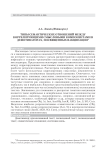
Статья научная
Настоящая статья посвящена изучению и демотиваторов, относящихся к вакцинации в период пандемии COVID-19, создаваемых российскими интернет-пользователями с начала распространения коронавирусной инфекции и ставших чрезвычайно популярными в социальных сетях и мессенджерах. Представлены некоторые типы семантических отношений между коррелирующими смысловыми компонентами, из них выделены наиболее репрезентативные. Рассмотрена специфика употребления наиболее часто используемых коррелирующих смысловых компонентов в демотиваторах, посвященных вакцинальной кампании. Отмечается, что большая часть значимых смысловых компонентов представлена в вербальной части анализируемых демотиваторов. Установлено, что наиболее частотные понятия как «вакцина» и «вакцинация» выражаются как невербально, так и вербально. Языковые средства (вербальные компоненты) дублируют иконическую часть (невербальные компоненты) поликодовых текстов. Значимыми для понимания и раскрытия тематики вакцинации являются такие вербальные и невербальные смысловые компоненты как «вакцинация», «вакцина», «вакцинировать», «шприц», «медицинский работник», «человек», «побочный эффект» и др., которые связаны семантическими отношениями Obj, At, Inst, InstObj, InstR, АКО, Loc, S, SO, Cntr. Выделены наиболее репрезентативные семантические отношения (Obj, At, Inst, InstObj), менее репрезентативные (Loc, S) и нерепрезентативные системные связи (InstR, АКО, SO, Cntr), установленные между значимыми смысловыми компонентами.
Бесплатно

Урбаноним "Липецк" в русской языковой картине мира: синхронический и диахронический аспекты
Статья научная
В современной филологии большое внимание уделяется изучению локальных сверхтекстов, объединенных вокруг того или иного топонима. Поскольку сверхтексты бывают связаны со значимыми для отечественной литературы и культуры городами, важно установить, какое место занимает тот или иной топоним в русской языковой картине мира. Целью данной статьи было исследование особенностей восприятия русским языковым сознанием урбанонима «Липецк». С помощью метода анкетирования были выявлены ключевые особенности современного восприятия данного урбанонима носителями русского языка, проживающими в городе Липецке. Респондентам было предложено назвать свои реакции на слово «Липецк», а также включить урбаноним в словосочетания разных типов и в предложения. Сделаны выводы, что восприятие Липецка как приятного города-курорта, характерное для текстов XIX в., в настоящее время вытесняется двойственным отношением к данному городу. С одной стороны, он предстает как в текстах современных писателей, так и в полученных анкетах индустриальным городом, сложным для жизни, с другой - восприятие Липецка большинством респондентов остается положительным. Полученные результаты имеют определенную теоретическую ценность (поскольку позволяют сделать выводы об изменениях в восприятии Липецка носителями русского языка и современном месте урбанонима «Липецк» в русской языковой картине мира), и практическую значимость, так как иллюстрируют степень удовлетворенности молодежи Липецком и дают возможность прогнозировать дальнейшие изменения в восприятии урбанонима.
Бесплатно
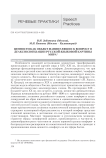
Ценности как объект манипуляции: к вопросу о деаксиологизации русской языковой картины мира
Статья научная
Особенности языковой актуализации ценностных трансформаций, происходящих в русской картине мира в XIX-XXI вв., исследуются на примере функционирования слова комфорт. Демонстрируется, что при вхождении в русский язык английское заимствование comfort / комфорт, заполняя понятийную и лингвистическую лакуны, номинирует инокультурную ценность. Восходящая к восточно-христианской традиции этика «аскетического самоограничения и самопожертвования» (Й. Херльт, К. Цендер), составляющая в XIX в. доминирующую ценностно-поведенческую модель общества в России, препятствует принятию им ценностей, обобщенно именуемых анализируемым словом. На протяжении XIX -большей части XX вв. оно остается, в целом, ценностно амбивалентным. В рамках начинающейся на рубеже 1980-1990-х гг. трансформации смысложизненных установок российского социума слово комфорт и актуализируемый им образ жизненного успеха в «цивилизованном обществе» становятся инструментом манипулятивного воздействия на сознание носителей русского языка. Средства массовой информации, пропагандирующие прагматические установки гедонистической концепции бытия, конструируют иллюзорный образ реальности, в которой комфорт предстает ключевой ценностью, а достижение его выступает единственной целью существования. Массовое тиражирование в русскоязычном медиапространстве образа «комфортной жизни», проявляющееся, в частности, в лавинообразном росте частотности лексем корневой группы комфорт- и беспрецедентном расширении их семантической валентности, приводит к проникновению квазиценности «комфорт» во все сферы бытия.
Бесплатно
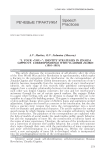
Статья научная
This article discusses the reconstitution of self-identity after the crisis of the First World War and the Revolution in ego-documents, which marks a fracture in the perception of the interlocutor. As the correspondence of Zinaida Gippius and Vladimir Zlobin demonstrates, the construction of one's identity becomes inseparable from the reconstruction of one's interlocutors' identity. An early stage of this recently fully published correspondence suggests how a complex relationship between interlocutors concerned with each other was forged. Gippius constructs her own and her interlocutor's autonomy through the use of certain speech markers. She engages Zlobin in a game where feeling, will, and the decision to change life turn out to be variables in a larger life-building project. This game is compounded by a time of deep political change, when some of Zlobin's hopes and aspirations needed adjustment. Gippius sees herself as a mentor to her interlocutor, but she also forms a special erotic tension that turns the correspondence into a novel with its dramatic and paradoxical character. The article explores the various speech means by which Gippius constructs the complex self-identity instilled in her interlocutor. The paradoxes of the correspondence are explained with the help of models of social masks: the mask implies public speech behavior, but also the topography of inner life, the construction of identity based on the topics of inner experiences. Therefore, the actions of the interlocutors are not a correction of someone else's public behavior, but a work with someone else's topics through their own, with the particularities of inner experiences and inner self-determination in a challenging era. Within the epistolary novel, a new cartography of inner life is developed, which is incorporated into the autobiographical myths of the correspondents.
Бесплатно

